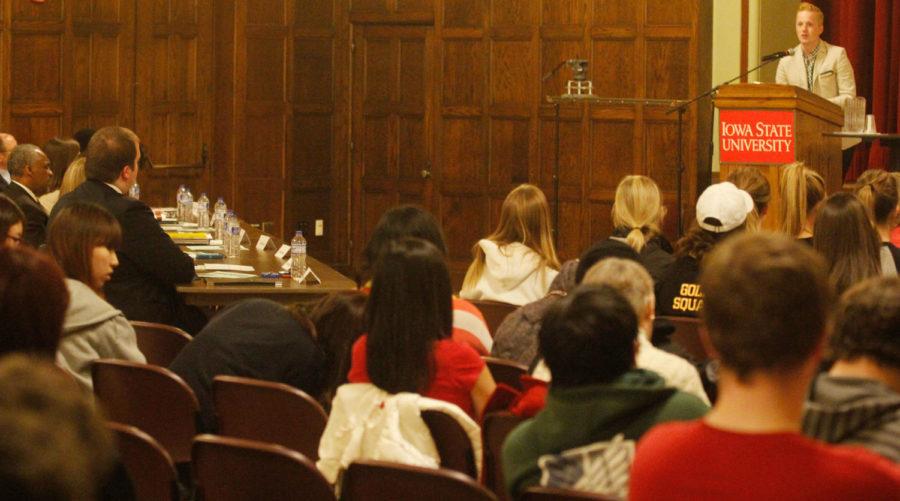Uhuru Magazine hosts motivational speakers at What Matters to Me and Why event
April 23, 2014
Ten ISU faculty members and students took their turn at the podium in the Great Hall to share their motivational stories to around 100 people at Uhuru Magazine’s event, What Matters to Me and Why, on Wednesday.
Briana Haguewood, senior in journalism and mass communication and managing editor of Uhuru Magazine, planned this event for the second time.
“We held the event a year ago and we knew it was important,” Haguewood said. “We’re holding it again and we knew there would be a market for it.”
Vice President for Student Affairs Tom Hill opened the event by discussing how he developed the values he has today.
“When I got the task of talking about what matters to me and why, I immediately thought of my family,” said Hill.
Hill talked about his childhood and how his family influenced who he is today.
“I had perfect attendance in school from the first to the 12th grade,” Hill said.
Hill said his mother believed in education and made sure that he attended school every day. He was the first in his family to graduate.
“I’m very passionate about education now,” Hill said. “It’s kind of interesting how that translates.”
Hill said it was never a question of whether or not his sons would go to college; the question was where they would go to college.
“As a lifelong learner, one of the things I find important to reflect upon your values and beliefs,” Hill said. “It’s important to ask myself, ‘What do I value and are the decisions I am making consistent with this?’”
If people don’t take the time to reflect upon their beliefs, they will be put in a situation that will test their values, Hill said.
“So what matters [is] those things that started back when I was a child; that matters and it’s still here,” Hill said.
Onalie Ariyabandhu, president of International Student Council, shared some of the most shocking memories from her survival of the Sri Lanka Tsunami of 2004.
“From my toes, to my knees, my thighs, to my waist, to my shoulders, to my neck — the van filled with water,” Ariyabandhu said.
Ariyabandhu described what it was like to be in her van as the waves submerged it.
“Are we dying, are we dying?” Ariyabandhu quoted her 9-year-old sister as saying.
Once she found her way to land, people pointed to a pile of dead bodies asking her to see if her mom was there and she refused, Ariyabandhu said.
“Your choices matter a lot,” Ariyabandhu said. “You can overcome a lot of incidents by having a little bit of hope, a bit more courage and a lot of optimism. Nothing is impossible.”
ISU basketball player Daniel Edozie shared how moving to the United States from London as a child has taught him to be the person he is today.
“I was on the streets [in Los Angeles] by myself a lot of nights, sleeping on busses and in parks,” said Edozie.
Many days Edozie said he would roam the streets alone looking for food or money.
“As a kid, you can’t get a job, so what you have to do is panhandle and ask for money for something to eat; there’s no other option,” Edozie said. “Days without eating isn’t easy.”
Edozie said his mother and him didn’t eat for a while, so as they passed a shelter that was serving food, he went inside to eat despite her disapproval.
“I went to go eat and when I came out, my mother wasn’t there,” Edozie said. “I thought, ‘So what, just another day of being on the streets by myself.’”
Edozie said people then approached him on the street that ended up calling the police.
“I was then picked up by the police and we searched around for my mother,” Edozie said.
After not being able to find his mother, Edozie then went to the police station where he met with a social worker that later matched him with a foster home, Edozie said.
“Now, I feel normal,” Edozie said. “I have learned that no matter what battle you face, there’s always a way to overcome it, but nobody is going to give it to you. You have to work for it.”







